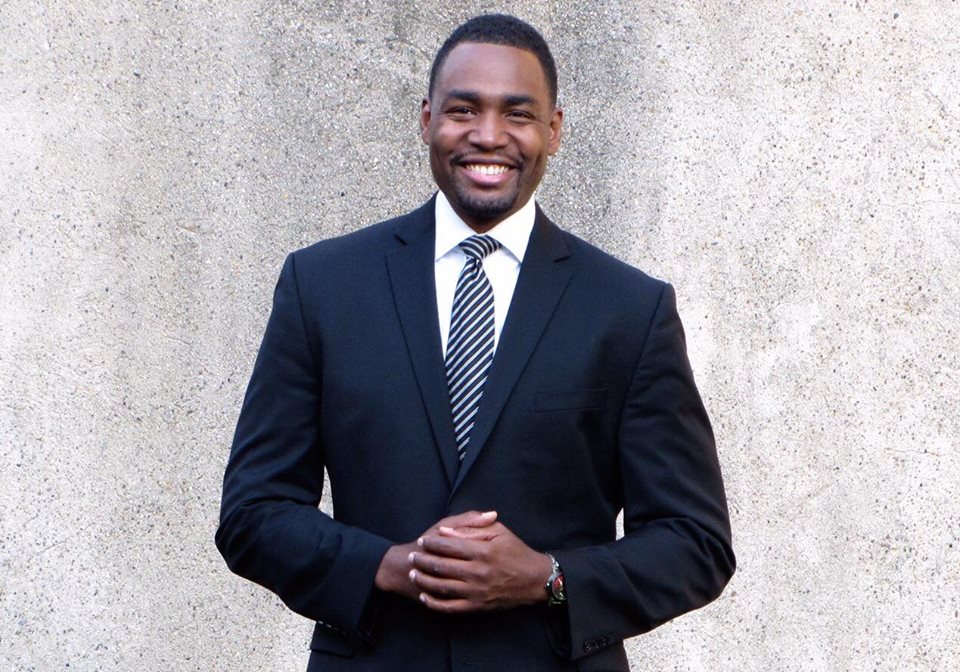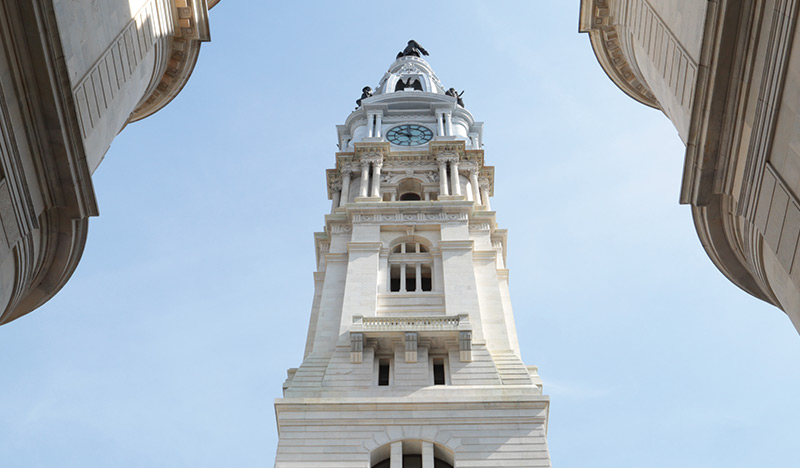Has Philadelphia ever elected a bona fide “outsider” as mayor?
It’s a question I’ve pondered after the ho-hum Democratic mayoral primary this May, which featured a trio of party stalwarts as frontrunners who were about as exciting as the ghosts of Party past (Lynne Abraham), present (Anthony Williams), and future (Jim Kenney).
As it turns out, I seemed to find one in Robert Eneas Lamberton, elected 75 years ago with credentials suggestive of a Bloomberg-ian type mayor: no prior legislative-branch experience; described in this beauty of a 1940 Time magazine feature as a “husky, unassuming and stubborn” bridge player who almost accidentally rose to be mayor.
But then I found another article in Time on Lamberton — who died 20 months into office — which explained his ascension a bit differently: “plucked by Boss Pew from a judgeship in a Common Pleas court.” Pew, of course, being Joseph Pew Jr., mastermind of the Republican party for a good portion of its six-decade reign dating back to the 1880s. Lamberton wasn’t an outsider at all.
So it appears that the Republican and Democratic machines, while exchanging dominant rule, have staked their claim to every mayor since Reconstruction. The result has been a lot of usual suspects being elected to the city’s top office: city councilmembers, U.S. representatives, district attorneys, that one irrepressible police chief.
The record repeated itself this spring, when the one candidate standing on the outskirts of the party establishment was fourth-place finisher Doug Oliver, who told me this much on primary-results night: “This here political machine isn’t new; it wasn’t invented last night. It has been here for decades and centuries.”
Oliver received a measly four percent of the vote in May

In another city, with a different primary process, Oliver’s share might’ve been double or triple the measly four percent of the vote he received in May. But in Philadelphia, where roughly 105,000 people have been all but disenfranchised because they aren’t registered as Democrats or Republicans, Oliver never had a shot.
Independent voters are precisely the type who might galvanize around a Republican-turned-Democrat who charismatically defied the labels of both parties throughout his run. It’s no wonder an outsider hasn’t been elected mayor in any of our lifetimes: We’ve excluded Independents from the only vote that matters — the primary.
“It doesn’t seem right that those votes and voters shouldn’t be a meaningful part of the process,” says David Thornburgh, president and CEO of the Committee of Seventy. “By not registering as Democrat or Republican, they’ve silenced themselves from the political process.”
Back in May, Thornburgh wrote a searching column on philly.com about ways to give the primary process “a shot of 21st century reform,” among them, opening up its antiquated ways. Although Philly is not alone in being a two-party primary closed off from Independents — New York, St. Louis and Washington, D.C. are similar — it’s certainly an outlier. Among the 30 largest metros, 20 include independent voters in local primary elections, as do 80 percent of municipalities overall — in one of two ways:
- The classic “open primary” which allows registered voters to select which primary in which to cast their ballot, typically as late as when they show up to the polls. This allows Independents to vote in either the Republican or Democratic election. Twenty-two states have some form of this, including Michigan and Missouri. (Certain cities, like St. Louis, have adopted home rule and thus have unique primary systems within the state.)
- The “top-two blanket primary,” in which parties are entirely abolished. All the candidates are listed together, regardless of party, and the top two compete in a November runoff. (Fourteen states use this, including Louisiana and California.)
A natural response to our political movement
Across the country, the shift away from two-party primaries appears to be a natural response to our political moment.
In a Gallup poll earlier this year, a record 43 percent of voting-age adults declared themselves political Independents (i.e. affiliating with neither of the two major parties) — and that share has climbed from 32 percent in 2004.
In a New York Times op-ed last year hyperbolically titled, “End Partisan Primaries, Save America,” New York Senator Chuck Schumer argued that some of the current partisan gridlock in Congress can be chalked up to the nature of the two-party primary. “The partisan primary system, which favors more ideologically pure candidates, has contributed to the election of more extreme officeholders and increased political polarization.“
Even if the turnout among Independent voters were no greater than the turnout among Democrats (an embarrassingly low 27 percent in May), that’d be another 30,000 voters that politicians would have to account for.
In Philly, no open-primary format led to Jim Kenney — who ran the most progressive-themed campaign out of all the candidates — getting elected by the widest margin of victory for any contested Democratic primary since at least 1979. No, he won by getting the support of Black political leaders like Marian Tasco, Darrell Clarke and Dwight Evans, along with the all-important nod from union leader John Dougherty — endorsements gained through the same old backroom handshaking and ward politicking that often shapes Philly elections.
Opening the primary format to Independents would do little to fundamentally shift that political ground. In fact, it’s common for political machines and nonpartisan elections to coexist.
“You’d be hard-pressed to say the Democratic party doesn’t run Detroit, where they have nonpartisan elections,” says John Opdycke, president of the national electoral reform group, Open Primaries. “So you’d have to say in New York or Philadelphia, the party would adapt just fine — Democrats would still get elected.”
Which means that advocates for open primaries aren’t fighting to abolish party control — at least not in the short term — but rather, for basic tenets of Democracy to be expanded to voters outside the two-party domain. “Mainstream political reformists want to talk about things like making sure the polling machines work right,” says Jennifer Bullock, director of PA Independents. “That’s important, but people are barely coming out to vote with these nice polling machines in the first place. I can’t even vote!”
Bullock is one of a multitude of Philadelphians who are politically engaged, and yet blocked from the primary process (aside from being allowed to vote for ballot initiatives). In July, Open Primaries conducted a survey of 346 Philadelphia Independents, and 87 percent said they were aware that their voter registration precluded them from primary participation, but did it anyway. To Opdycke, the response suggests these voters are politically informed, “and they’re basically saying ‘I will not sanction a fundamentally corrupt system.’”
Another 30,000 voters, anyone?
Even if the turnout among Independent voters were no greater than the turnout among Democrats (an embarrassingly low 27 percent in May), that’d be another 30,000 voters that politicians would have to account for — voters who don’t fit into a clear box and might be swayed by someone like Doug Oliver, whose lack of party orthodoxy showed in the primary debates.
Oliver voiced a pro-business streak, supported improving green infrastructure, made controversial remarks about police-community relations, and refused to take sides in the charter-public schools debate. The unconventional charisma he exuded kinda-sorta-almost (but didn’t) earn the endorsement of Ed Rendell. It might’ve attracted votes from thousands more, too, in an open primary.
Of course, there are those who see the partisan primary as a safeguard against shenanigans like coordinating voters to elect a weaker candidate in the other party’s primary. Such was the case in 2010 with Alvin Greene, the Army veteran in South Carolina who became a cause celebre as the Democratic nominee for a U.S. Senate seat.
Additionally, critics have argued that political parties have a right to select their own nominees without intrusion from non-members. Bullock has also heard another knock against it. “Partyists are saying that the Democratic party machine is how we’re going to empower people of color and the disenfranchised,” she says. “But that’s kind of racist in itself, as if the Democratic party owns the poor and people of color.”
So, could it actually happen here in Philly? It’s no more than a pipe dream.
“The last time a city tried to reform its primary process was New York City in 2003 — and it was a bloodbath,” says Opdycke. Both the Democratic and Republican parties lined up against a coalition formed by Mayor Michael Bloomberg and the Independence Party of New York City, defeating the referendum that would’ve changed the process.
Given the money and ambition that was squashed in that campaign, the prospects are even bleaker in slow-to-change Philadelphia. If anything, a bill would have to pass in Harrisburg, but that, too, seems like a long shot. In 2012, the bills of State Senator Anthony Williams and State Representative Eugene DePasquale languished in committees, just like all the other bills that have gained no traction in recent years.
It’s a wasted opportunity for Philly, though, which (surprise, surprise) needs to catch up with most of the country. With the city Democratic party’s power on the decline, electoral reform in the ethos (see: Larry Lessig quixotic presidential bid) and voter turnout having hit historic lows, the timing couldn’t be better. Just don’t count on it, not anytime soon, at least.
![]()
MORE ON ELECTORAL POLITICS FROM THE CITIZEN



